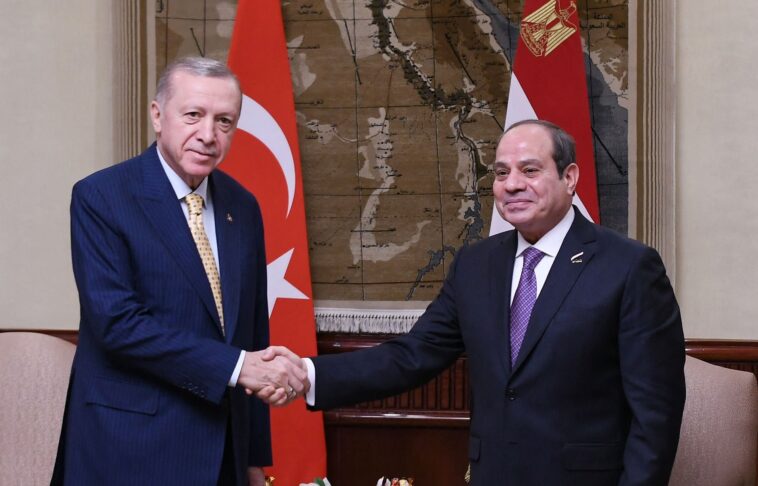The two leaders also criticised Israel’s conduct of the war in the Gaza Strip and called for a ceasefire. Al-Sisi welcomed Erdogan with great fanfare at Cairo airport before the pair signed several agreements.
They both called for “a new stage in relations”, an increase in trade to “$15bn per year within a few years” and diplomatic cooperation in the Middle East. Erdogan, an outspoken critic of Israel’s conduct in its war with Gaza’s rulers Hamas, again aimed at the government of Israeli prime minister Benjamin Netanyahu.
Denouncing Netanyahu
The Turkish leader, on his first visit to Egypt in more than 10 years, denounced Netanyahu’s “occupation, destruction and massacres”. Erdogan said the Palestinians were “at the top of our agenda” and that it was “our priority to establish a ceasefire as soon as possible”.
Turkey was “ready to work with Egypt for the recovery and reconstruction of Gaza in the medium term,” he added.
For his part, Al-Sisi criticised “Israel’s obstacles which mean that humanitarian aid enters Gaza too slowly”. Egypt controls the Rafah crossing into Gaza, but Israel insists on inspecting every aid shipment.
Cairo has been hosting joint efforts with Qatar and the US to broker a new truce between Israel and Hamas. An Israel delegation was in Cairo on Tuesday, while a Hamas delegation was to travel to the Egyptian capital on Wednesday.
Long freeze in relations
Turkey and Egypt cut ties in 2013 after Al-Sisi, then defence minister, ousted Islamist president Mohamed Morsi, an ally of Ankara and part of the Muslim Brotherhood movement.
At the time, Erdogan said he would never speak to “anyone” like Al-Sisi, who in 2014 became president of the Arab world’s most populous nation. Relations have thawed since 2021 when a Turkish delegation visited Egypt to discuss normalisation. By last July, Cairo and Ankara appointed ambassadors to each other’s capitals for the first time in a decade.
In November 2022, Erdogan and Al-Sisi shook hands in Qatar in what the Egyptian presidency heralded as a new beginning for their relations. The two men have since met in several other countries, including Saudi Arabia in November and at the G20 summit in India in September.
Despite the long freeze in relations, trade between the two continued. According to Egyptian central bank figures, Turkey is Egypt’s fifth largest trade partner. Earlier this month, Turkish foreign minister Hakan Fidan said an agreement had been finalised to provide drones to Egypt.
While the two regional powers have often been at odds – including supporting rival governments in Libya – their interests are aligned on two major conflicts: Sudan and Gaza.
Harsh critic
Erdogan has emerged as one of the Muslim world’s harshest critics of Israel for its bombardment and ground offensive in Gaza, which have killed at least 28,576 people, mostly women and children, according to the health ministry in the Hamas-run Palestinian territory.
The war was triggered by Hamas’s unprecedented 7 October attack on Israel which resulted in the deaths of about 1,160 people, mostly civilians, according to an AFP tally based on official Israeli figures.
On Wednesday, Erdogan said it would be “madness” if Israel were to follow through with plans for an assault on Rafah, the southern city where more than half of Gaza’s population has sought refuge from the fighting, warning it would “eventually lead to genocide”.
Istanbul served as a base for Hamas political leaders before the 7 October attack. The NATO member asked the Hamas chiefs to leave after some were captured on video celebrating the attack.
Ankara in November recalled its ambassador to Israel and has maintained intermittent communication with the Hamas leadership, who see Turkey as a potential ally in ceasefire negotiations.
Erdogan said he had invited Al-Sisi to visit Ankara “at the first opportunity”.
Understand Africa’s tomorrow… today
We believe that Africa is poorly represented, and badly under-estimated. Beyond the vast opportunity manifest in African markets, we highlight people who make a difference; leaders turning the tide, youth driving change, and an indefatigable business community. That is what we believe will change the continent, and that is what we report on. With hard-hitting investigations, innovative analysis and deep dives into countries and sectors, The Africa Report delivers the insight you need.

